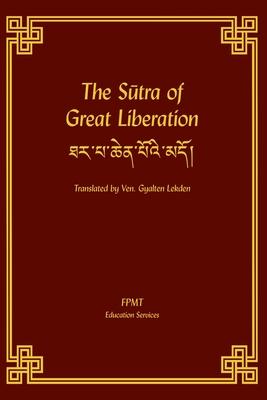
Whoever holds this sutra holds the body of the Buddha.
Whoever practices this sutra practices the activities of the Buddha.
Whoever explains this sutra explains the activities of the Buddha.
Whoever understands the meaning of this sutra understands the meaning of the Buddha." The unimaginable benefits of engaging with The Sutra of Great Liberation (thar pa chhen pi do) featured most prominently in the later years of Lama Zopa Rinpoche's teachings, although Rinpoche is reported to have spoken of them as early as 20O6. Rinpoche emphasized that engaging with the sutra in any way, even unintentionally, is profoundly beneficial. Let alone reciting the sutra or its mantra, even hearing any part of the sutra or keeping a copy of the sutra brings immeasurable benefit. Reciting the sutra, for instance, also easily purifies negative karma. Some of the myriad and powerful ways that it helps us to overcome suffering and attain enlightenment are mentioned in the sutra itself:
"Son of the lineage, reading aloud and holding this sutra, even if you were previously an evil person endowed with negativities, makes you now one endowed with virtue. Even if you previously had suffering, now you have resources... Even if you previously had contamination, now you are free from contamination... Even if you were previously in contradiction with the path of Dharma, now you enter the path of the aryas. Even though you have the body of an ordinary being, because of reading aloud and holding this sutra, your mind is like the wisdom of an arya. Even though you previously had afflictions, because of reading aloud and holding this sutra, you have the passing beyond sorrow that is similar to that of a buddha bhagavan." The Sutra of Great Liberation is formally titled The Arya Mahayana Sutra Called "Arya All-Expansive Great Liberation, Purifying Negative Deeds through Cleansing Remorse, Perfectly Arranged Accomplishment of Buddhahood" (Phag pa thar pa chhen po chhog su gy pa gy tshang kyi dig jang te sang gy su drub par nam par k pa theg pa chhen pi do). The Tibetan text, found in the Kangyur, is a translation of the Chinese rendition, the Sanskrit source text having been lost over the course of time. This translation was undertaken by Ven. Gyalten Lekden at the behest of Rinpoche, who, seeing its benefits, wished for it to be made easily accessible to more people. 188 pages, 2023 Edition.
Whoever holds this sutra holds the body of the Buddha.
Whoever practices this sutra practices the activities of the Buddha.
Whoever explains this sutra explains the activities of the Buddha.
Whoever understands the meaning of this sutra understands the meaning of the Buddha." The unimaginable benefits of engaging with The Sutra of Great Liberation (thar pa chhen pi do) featured most prominently in the later years of Lama Zopa Rinpoche's teachings, although Rinpoche is reported to have spoken of them as early as 20O6. Rinpoche emphasized that engaging with the sutra in any way, even unintentionally, is profoundly beneficial. Let alone reciting the sutra or its mantra, even hearing any part of the sutra or keeping a copy of the sutra brings immeasurable benefit. Reciting the sutra, for instance, also easily purifies negative karma. Some of the myriad and powerful ways that it helps us to overcome suffering and attain enlightenment are mentioned in the sutra itself:
"Son of the lineage, reading aloud and holding this sutra, even if you were previously an evil person endowed with negativities, makes you now one endowed with virtue. Even if you previously had suffering, now you have resources... Even if you previously had contamination, now you are free from contamination... Even if you were previously in contradiction with the path of Dharma, now you enter the path of the aryas. Even though you have the body of an ordinary being, because of reading aloud and holding this sutra, your mind is like the wisdom of an arya. Even though you previously had afflictions, because of reading aloud and holding this sutra, you have the passing beyond sorrow that is similar to that of a buddha bhagavan." The Sutra of Great Liberation is formally titled The Arya Mahayana Sutra Called "Arya All-Expansive Great Liberation, Purifying Negative Deeds through Cleansing Remorse, Perfectly Arranged Accomplishment of Buddhahood" (Phag pa thar pa chhen po chhog su gy pa gy tshang kyi dig jang te sang gy su drub par nam par k pa theg pa chhen pi do). The Tibetan text, found in the Kangyur, is a translation of the Chinese rendition, the Sanskrit source text having been lost over the course of time. This translation was undertaken by Ven. Gyalten Lekden at the behest of Rinpoche, who, seeing its benefits, wished for it to be made easily accessible to more people. 188 pages, 2023 Edition.
Paperback
$8.99